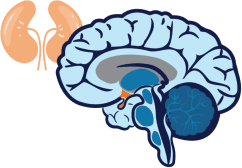
Weight and behavior with deflazacort
Deflazacort has a smaller suppressive effect on the
hypothalamic-pituitary adrenal (HPA) axis vs prednisone; considering a small concentration of deflazacort crosses the blood brain barrier reaching the HPA axis, a reduced risk of behavioral disorders has been hypothesized.6


Compared to those on prednisone, patients taking deflazacort in clinical trials were7

Less likely to gain weight

Less likely to experience psychiatric side effects (ie, abnormal behavior, aggression, irritability, and
mood swings)

Less likely to discontinue treatment due to side effects
- Psychiatric adverse events generally appeared at a higher rate in the prednisone group vs both deflazacort groups7
- Abnormal behavior, aggression, irritability, and mood swings were more commonly reported in the prednisone group
- Psychotic disorder was reported more frequently in the deflazacort group
Study Limitations
Comparisons between deflazacort and prednisone are not included in the Prescribing Information for deflazacort because prednisone is not an approved treatment for DMD.



